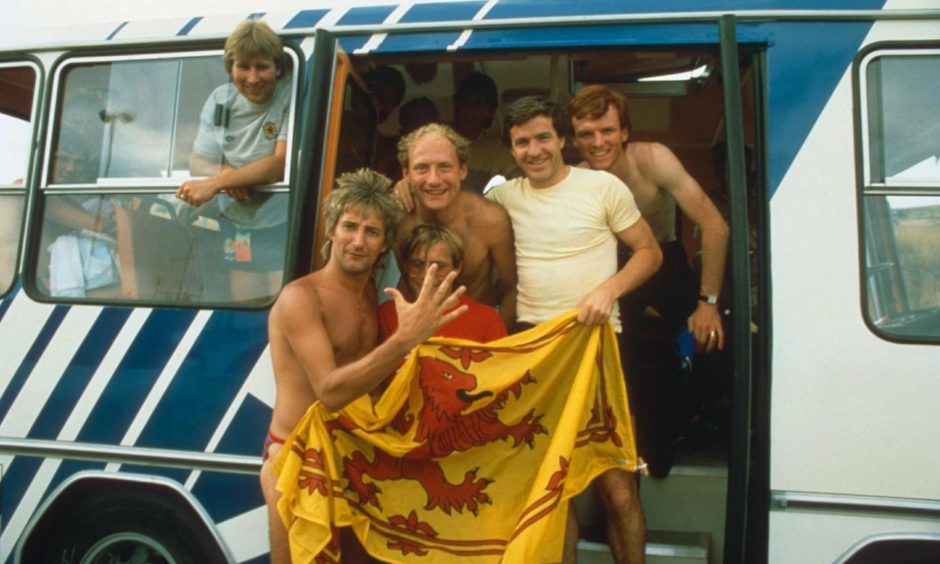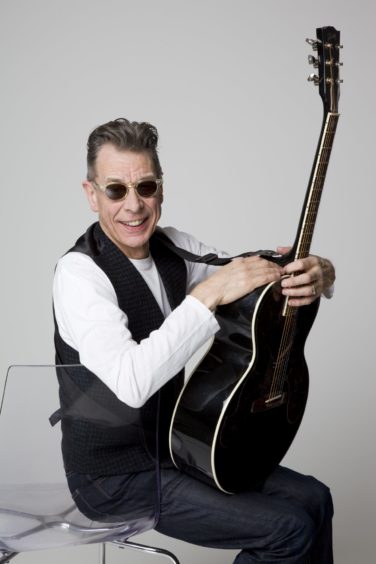
Footballers and pop music have usually gone together as well as Paul and Bamber Gascoigne.
Scotland’s finest may have qualified for five consecutive World Cups between 1974 and 1990, but the songs produced to mark these achievements were rarely in danger of being confused with The Beatles or Bob Dylan.
The memory of Andy Cameron serving up Ally’s Tartan Army on Top of the Pops, in advance of the 1978 tournament in Argentina, still pains those who witnessed one of the great sporting fiascos unfold in South America.
But it wasn’t any worse than when rock royalty, Rod Stewart, came up with Ole Ola, a lethal combination of fake samba rhythms, Archie Macpherson’s OTT commentary and a kitsch chorus which was clearly written on the back of a season ticket and left William McGonagall looking like Robert Burns.
So which, if any, of these Scotland football songs deserves to escape from the group stages?
And which should share the fate of Ally’s squad and be airbrushed from history?
A wry, ironic tone took over in 1982
The debacle on the pampas and struggles with Irn-Bru – sorry Iran and Peru – meant there was slightly more realism in the air when BA Robertson and Gregory’s Girl star John Gordon Sinclair joined forces with the Scotland squad to record We Have a Dream before the 1982 World Cup in Spain.
This was a ditty with a knowing lyric, a catchy chorus and the underlying acceptance that the Scots wouldn’t be snaffling the Jules Rimet Trophy.
Yet goalkeeper Alan Rough recalled the chaos which surrounded the squad appearing on TOTP, even as players forgot what they were meant to be singing and some were swaying for reasons which had nothing to do with music.
As Rough said: “The BBC decided that we had to fly down to London on the night before the live broadcast, so we all enjoyed an evening’s plush hospitality, prior to arriving at the studio at midday for a rehearsal.
“What they didn’t tell us was that they wanted to put us through our paces three times, prior to appearing live at 7.30pm. These rehearsals passed quickly, leaving the guys plenty of time to sit around in the BBC bar.
“Looking at the clip today, you can see us all swaying, with several of the more sober lads stopping the others from falling down. John Robertson had been asked to hold a football, but he was so plastered he had forgotten the words and was reduced to lurching in front of the camera, slobbering nonsense.
“Fortunately, John and BA were true professionals and served up an excellent live version, which helped the song soar towards the summit of the charts.”
It was more cheesy than easy in 1974
The whole business of the team members recording potential hits had started in 1974 when Willie Ormond’s squad unveiled Easy, Easy as the prelude to participating in another competition where they were dogged by bad luck.
Prolific hit-maker Bill Martin, who had previously penned such No 1 songs as Congratulations and Puppet on a String for Cliff Richard and Sandie Shaw – and was also the catalyst for the England squad’s 1970 effort Back Home – was tasked with creating a work to stir the nation.
Let’s be kind and merely conclude that he wasn’t at the top of his game.
“Yaba daba doo, we support the boys in blue and it’s easy, easy, yaba daba doo, we are going to follow you and it’s easy, easy.
“Yaba daba day, we’ll be with you all the way”…. but that’s enough of that.
It might have had a Flintstones-style theme, but this was no rock epic. And the team suffered further ignominy when they were eliminated without losing a game in Germany, kicked out on goal difference after beating Zaire and drawing creditably with Brazil and Yugoslavia.
Mexico 86 and the Scotland football song that time forgot…
On the face of it, there were promising signs for Big Trip to Mexico, which was recorded by such luminaries as Graeme Souness, Kenny Dalglish, Willie Miller, Rough (again) and Gordon Strachan, prior to Alex Ferguson taking his men to another major tournament.
It was written by Tony Hiller – a veteran of the showbusiness industry who was responsible for the 1976 Eurovision winner Save Your Kisses for Me by Brotherhood of Man – and Rab Noakes, who had previously been part of Stealers Wheel with Gerry Rafferty and enjoyed an illustrious solo career.
However, it seems there is something about these anthems which drags everybody down to the same level of mundane mediocrity.
Noakes spoke about the disc and revealed that its original title was Shortcut to Mexico.
And he explained how the studio producers tackled dealing with the more vocally-challenged members of the squad.
He said: “That was done in a big studio in Glasgow. There were about 20 of the players and engineer Cy Jack set up five microphones.
“We put four guys on each and went down and listened to all of them singing. Then we shifted them round a bit, on the pretext of getting a balance of voices on each of the mics.
“In fact, we were identifying the more tuneless ones. We put them on the same microphone and switched it off!”
As for the footballers, they lost their opening two matches, couldn’t beat 10-man Uruguay, who had a man sent off in the first minute, and returned home to general indifference. The Big Sleep, not the Big Trip!
Saying It with Pride in 1990
Once again, even as Scottish football supporters grew accustomed to their national side reaching the finals of major tournaments, there was plenty of talent involved in the recording of their official anthem Say It with Pride.
Guests on the track included Fish from Marillion, James Grant of Love & Money, Donnie Munro from Runrig, Jimmie O’Neill of The Silencers and the drums on the track were played by Deacon Blue’s Dougie Vipond.
The intro was reminiscent of Do They Know It’s Christmas, and there was a spiritual feel to the composition, but sadly, it was all a bit po-faced and dour, a song with more of John Greig in its DNA than Jim Baxter.
Oh, and where was the tune?
Or the acknowledgment that the best Scotland football songs are those which can actually be sung by fans? You’ll Never Walk Alone.
Paper Roses. 500 Miles. And Yes, Sir, I Can Boogie.
While all these stars were assembling at Cava Studios in Glasgow, another song was recorded in the unlikely setting of a bedroom in Arbroath.
This Scotland football song was about as successful as the team…
Andy Stewart was approached by Edinburgh-based Rabble FC to lend his vocal talents to Scotland Scotland after Andy Roxburgh’s team had booked their passage to the competition in Italy.
And the popular entertainer was persuaded to provide three talking comedy verses in cod-Italian, an affected English accent and a cockney patois.
It could hardly have been a bigger contrast from the official song, but, once again, the World Cup turned into the Tracks of my Tears for the Tartan Army.
Costa Rica sprung an early shock by beating the Scots and, although Roxburgh’s team rallied to prevail over Sweden in their next tussle, they were eventually knocked out when they lost to Brazil 1-0 in their final match.
By this stage, the world-weary fans were wishing they could book a slightly longer time away with their heroes.
And that theme was very evident when Del Amitri entered the stage in 1998.
It hit the spot, but the Scots bombed
Justin Currie was the man behind the plangent Don’t Come Home Too Soon, which featured a distinctly downbeat message for the team as they prepared to travel to France.
Released at the start of June, the lyrics ran:
“So long, go on and do your best,
“Let all friends have whiskey on its breath,
“The world may not be shaking yet
“But you might prove them wrong,
“Even long shots make it”.
It was hardly an inspirational up-and-‘at-em message, but the song went to No 1 in the Scottish charts and peaked at No 15 in the UK standings.
And, sadly, the team did return home with their usual haste, putting up a brave show against Brazil, as the prelude to drawing with Norway.
But then, in the crunch meeting with unfancied Morocco, Craig Brown’s men slumped to a 3-0 loss, burdened by a red card for Craig Burley.
The Belgrade boogie
And that was when the music stopped for all of 23 years, which may or may not be a good thing, depending on your perspective.
That is until Euro 2020 arrived (in 2021!).
The Scots were back at a major tournament and Steve Clarke was a national hero.
And Yes, Sir, I Can Boogie had made its way from Andy Considine’s dressing room playlist to the terraces.
Finally, a song with a happy ending.

Conversation